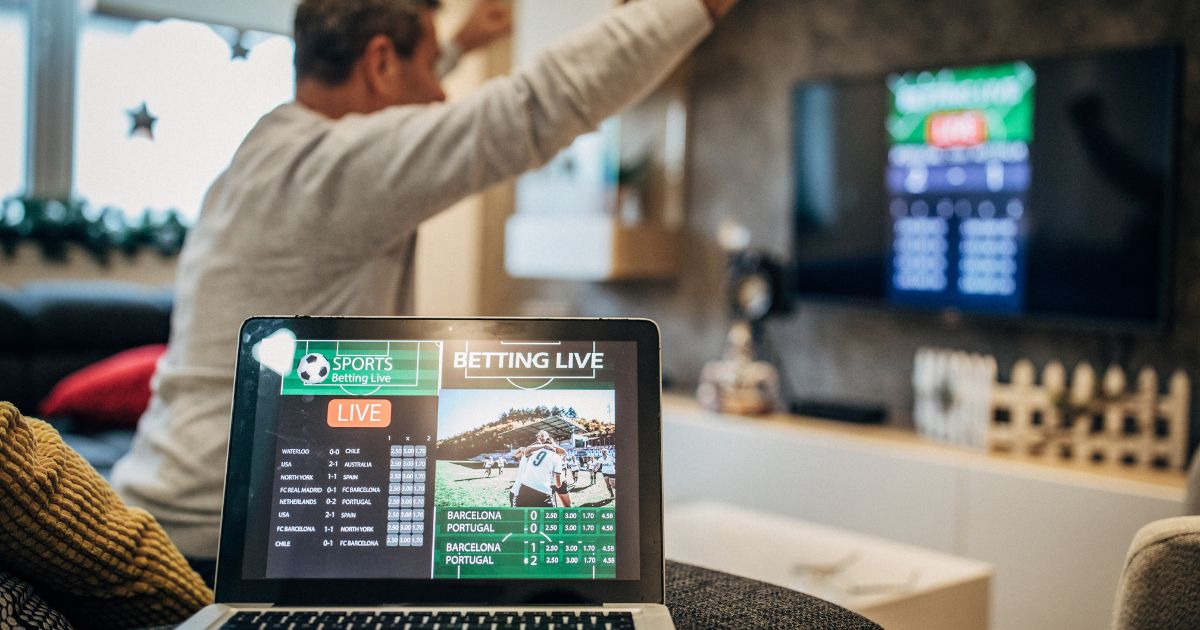How Does Sports Betting Work: A Complete Guide for Beginners

What is Sports Betting?
Sports betting is an exciting way of watching sporting events. You predict outcomes and place a wager on a potential result.
Of course, the risk of losing money is always there. That’s why it’s important to make informed bets. Sports betting odds involve multiple factors that affect the outcome.
Before we discuss those factors, let’s delve into the roles first. Here are the individuals involved in sports betting:
- Bettors: These people place wagers on physical or online sportsbooks. For example, sports bettors can bet on the final score of an NBA game.
- Bookmakers: These are individuals who set odds and accept bets. They offer competitive odds while also ensuring profit.
- Sportsbooks: Bettors can place bets on a physical or online sportsbook. These sportsbooks manage everything, from collecting wagers to giving payouts.
That’s not all you need to know about sports betting, though. You can wager on multiple bets, as we’ll discuss below.
Different types of bets
Sports betting is more than just betting on which team will win. There are different sports bet types, including the following:
- Moneyline bets: A moneyline bet is a straightforward wager. You just have to pick the winning player or team.
- Point spread bets: There might be games with heavy favorites. To balance the odds, bookmakers offer a point spread bet. For example, the Miami Heat is favored by 8 points against the Boston Celtics. You can bet on the Heat by more than 8 points to win the game. You can also bet the Heat will win outright or lose by less than the spread.
- Over/under (totals) bets: This is where you predict the total points scored in a game. For example, you can bet on an MLB game’s total number of runs.
- Parlays: Parlays allow you to place more than one bet in a single wager. You can bet on multiple games in a parlay. For you to win, all of your bets should be correct.
- Teasers and pleasers: These are different versions of a parlay bet. You could adjust the point spread in your favor (teaser) or against your favor (pleaser).
- Prop bets: A prop bet isn’t necessarily connected to the final outcome. Prop bets are predictions on particular events or outcomes within the game. For example, you can bet on the first player who’ll score in a basketball game.
- Futures bets: A futures bet on sports games is a long-term prediction. You can place a sports wager on season-long awards like MVPs and championships.
This information isn’t just for bettors and sports fans. It’s also important for bookies who want to start a sportsbook business.
How Do Betting Odds Work?
Successful bettors make informed bets based on their understanding of how betting odds work.
Decimal odds
Decimal odds are typically used in Europe and Australia. These numbers show the total return of a potential payout. It includes the original stake, plus the profit for a winning bet.
Decimal odds are easy to understand. You’ll know how much you’ll receive for every $1 wagered.
Let’s say you have some money wagered on one team. Here’s how it goes:
- You placed a $15 bet for the Tampa Bay Buccaneers to win.
- If the odds are at 2.0 for heads, then you’ll win $30 for a successful bet.
Basically, you just multiply your original stake by the decimal odds. That’s how you can calculate your potential winnings.

Fractional odds
Fractional odds are usually present in Ireland and in the UK. Your potential profit is shown side by side with your original stake.
Fractional odds are written like this: 3/1. The first number (numerator) represents your potential profit. The second number (denominator) is the amount you wagered.
For example, you’re betting on horse racing. Here’s how you can calculate your winnings:
- You placed a $10 bet on a horse with odds of 7/2.
- You divide the numerator by the denominator, then add the profit to your stake.
- Dividing 7 (numerator) by 2 (denominator) gets you $3.50 profit.
- Add the profit to your original stake of $10.
- You’ll then get $13.50 for a winning wager.

American (moneyline) odds
American odds are represented by positive and negative numbers. This is usually the default format of sportsbooks in the United States.
Positive odds favor underdogs, while negative odds favor favorites. Positive odds indicate how much profit you can get for a $100 wager. Negative odds indicate how much you should risk to win $100.
Here’s a quick example:
- The Washington Wizards are on a (+180) odds.
- You take the chance and bet on the Wizards to win the game. You placed a $50 wager.
- You’ll get a profit of $140 if the Wizards win. This is the combined $50 bet and the $90 profit for the (+180) odds.
Negative odds present a safer but less profitable choice. If you want to win bigger, go for odds with positive (+) signs.

What Is the Point Spread in Sports Betting?
Bookies try to balance the books to offer competitive odds. It’s actually one of the best sports betting marketing strategies today. They guarantee profit while still offering attractive odds.
Sportsbooks do this by integrating the “spread”. This is essential in balancing odds when there’s a very strong favorite. To cover the spread, the favorites have to win by a predetermined margin.
Here’s a quick example:
How Bookmakers Set Odds
By 2025, the number of US-based sports bettors will reach 37 million. That’s a huge customer base to tap into.
That’s why bookmakers scramble to offer competitive odds. It’s a complex process that involves the following steps:
- Sports statistics: Bookmakers study every team and player statistic there is. They monitor historical data and league trends. Moreover, they work with sports analysts and handicappers to analyze potential outcomes.
- Betting patterns: Sportsbooks also monitor trends in the betting market. They track competitors’ odds and bettors’ favorite choices. This way, they could adjust the odds for the less popular choice.
- Risk management: Bettors aren’t the only ones risking money. Bookmakers also balance the odds so they can guarantee profits. They have to produce fair odds, though. This is crucial in establishing a loyal customer base.
A sports betting strategy is not only applicable to bettors. Bookmakers also employ their own tactics in setting odds. They analyze factors like recent performances, injuries, and other advantages.
The Betting Process
Now, let’s discuss the steps on how you can actually place a bet on sports events.
Choosing a reliable sportsbook
Before you bet on sports teams, make sure that you’re using a reliable sportsbook. Here are factors to consider when choosing a sportsbook:
- Legal compliance: Make sure that the sportsbook is licensed and regulated. Typically, sportsbooks display their licensing information on their websites.
- Reviews: Always look for customer reviews by placing a betting slip. You can check online reviews on Google, social media, and sportsbooks’ websites. Reviews also let you know about a sportsbook’s customer support capability.
- Security: Choose sportsbooks that implement encryptions and authentications. Protect your personal information and payment details at all times.
- Betting options: Sportsbooks offer different odds formats. That includes a moneyline bet, spread bet, or straight bet. Make sure that the sportsbook offers the betting option you want.
Also, look out for bonuses and promotions. Some sportsbooks offer welcome bonuses for new bettors.

Registering and funding your account
Once you’ve chosen a sportsbook, the next step is to register. Most sportsbooks follow these registration and funding steps:
- Registration form: Click on the sign-up button on the sportsbook’s website. This will lead you to the registration form. Typically, you’ll enter your name, address, birth date, and email address. You’ll also be asked to create a username and password.
- Identity verification: Licensing authorities require sportsbooks to implement identity verification. This is to prevent fraudulent activities. You’ll be required to provide government-issued IDs or other verification documents.
- Account funding: Once your account is verified, you can deposit funds. Sportsbooks typically set minimum or maximum deposit limits.

Selecting events and markets
We know that one bet could make or break your day. Making an infomed bet starts in selecting events and markets.
Don’t just place bets on trending events, though. Follow these guidelines in selecting games or matches:
- Familiarity: Choose sporting events you’re already familiar with. This gives you a headstart when analyzing potential outcomes.
- Analysis: Don’t just rely on implied probability from sportsbooks. Do your own analysis on specific matchups. Analyze head-to-head records, injuries, and advanced analytics.
- Variations: Explore beyond moneylines. Try your hand on spread bets, totals, and prop bets.

Placing your bet
Once you’ve selected your event, you can now place bets. Here are quick steps on how to place wagers:
- Choose the outcome you want to wager on. If you’re going for parlays, you need to choose multiple outcomes.
- On the bet slip, enter your wager amount.
- Review everything before clicking on the “Confirm” button. Check your wager amount and outcome selection.
Of course, we recommend gambling responsibly. Before you place a bet, ensure that you have a predetermined budget. Stick to this budget so as not to lose large amount of money.

Online Sports Betting vs Traditional Betting
It was in 1996 when the first online sports bet was placed. Licensed betting platform Intertops hosted this bet.
The online betting industry has grown since then. The list of benefits is steadily outgrowing those of traditional platforms. Take a look:
- Convenience: The advent of smartphones boosted online betting even more. People can now place sports bets anytime and anywhere.
- Odds comparison: The Internet allows you to compare odds from different sportsbooks. You can easily choose the most competitive odds and favorable lines.
- Bonuses: Online sportsbooks offer a ton of bonuses and promotions. You can compare online bookmakers regarding their promotions.
Of course, online platforms have their own challenges. The security aspect of it is already a big one. Check licenses and customer reviews first before committing to a platform.
Moreover, online bookmakers might find it difficult to penetrate the market. The industry is already brimming with competition. To get ahead, they need powerful marketing strategies.
That’s why several sportsbooks partner with digital marketing experts instead. For instance, Fortis Media is a sportsbook marketing agency that implements innovative strategies. They constantly study the sports betting market to come up with effective marketing tactics.
For bookies, working with marketing experts is more cost-effective. Get your marketing playbook done while you focus on product development.

Key Strategies for Successful Sports Betting
To wrap it up, let’s analyze some of the key strategies in sports betting:
- Bankroll management: Look at this as an investment, not as a money dump. Gamble responsibly and stick to your budget.
- Research and analysis: Follow your knowledge in placing wagers. Dive into team performances, player injuries, and any relevant news.
- Understanding value bets: Analyze historical data and potential returns. This will allow you to target value bets and higher payouts.
- Using betting systems: Betting systems help you come up with different strategies. Some of the proven systems include Martingale, Fibonacci, and Kelly Criterion.
Still, we can’t stress enough the importance of responsible gambling. Sportsbooks allow you to self-exclude or set deposit limits. Use these features to avoid gambling addiction.
Key Takeaways
Whether you’re online or in a physical Las Vegas casino, one bet can change your life. Here’s sports betting explained in one term: prediction. There’s nothing definite in the world of sports betting. That’s why you need to take a careful approach. Delve into sports updates and news. Consult with sports experts and analytics platforms. Take care of your money by making informed bets.
FAQS ABOUT SPORTS BETTING
What are the different types of sports bets?
Sports bets are categorized into wager types and number of selections. Bettors can choose different wager types, including moneylines, point spreads, totals, parlays, futures, and props. Moreover, sports bettors can also make a single bet or combine a variety of bets into one wager.
How do bookmakers set their odds?
Bookmakers consider numerous factors in setting odds, including statistical analysis, expert opinions, betting patterns, and risk management. Sportsbooks and bookies fine-tune their odds by analyzing historical data, head-to-head records, player injuries, and league contexts. They aim to offer competitive odds while also guaranteeing their profit.
What is the best strategy for betting on sports?
While there is no one-off strategy to guarantee successful sports bets, there are steps for you to make informed wagers. These steps includes analyzing team performances and news, choosing sportsbooks with higher value bets, and shopping for more favorable lines.
How can I avoid common sports betting mistakes?
Avoid sports betting pitfalls by setting realistic budgets, doing in-depth sports analysis, and ignoring emotions when placing bets. Getting greedy or chasing the highest payout could pose tons of risks for bettors. This could lead to impulsive bets, especially after consecutive losses.
Read our other articles

Benefits of Enterprise SEO: Why Large-Scale Businesses Need It


B2B SaaS SEO: Best Practices and Strategy for 2025


Top 5 Trends for Enterprise SEO in 2025






